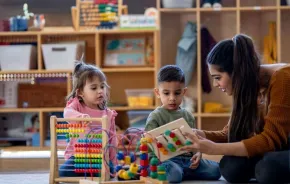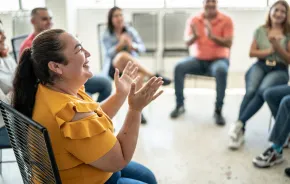 The best part about having kids who also have kids is that you get to say things like “You don’t know how good you have it. When we were raising you, the word ‘text’ was still a noun. The Cookie Monster never ate fruit. Full House was the best thing on TV, and Pee-wee Herman was a national icon.”
The best part about having kids who also have kids is that you get to say things like “You don’t know how good you have it. When we were raising you, the word ‘text’ was still a noun. The Cookie Monster never ate fruit. Full House was the best thing on TV, and Pee-wee Herman was a national icon.”
But I’ve been giving this a lot of thought lately, and here’s what I’ve concluded: It’s harder, not easier, to raise children these days.
For starters, when I was raising kids, there was a lot less happening in the world. At least it seemed that way.
Sure, there were newsworthy events going on, and we kept track of them through magazines, newspapers and television. But there was a sizable time lag between when something actually happened and when we found out it happened. No Twitter, no Instagram, no Mark Zuckerberg. We had less information, fewer opinionators and no bloggers. The world was still round.
That means we didn’t need to talk to our kids nearly as much about tricky topics like guns. Or terrorism. Or drugs, or sex or twerking.
Before the endless news cycle and screen scene kicked in, children weren’t exposed to life’s realities in quite the same up-close, personal and utterly unavoidable way they are now. Parents could decide what to reveal to their kids (“No, he did not have sex with that woman”) and when to reveal it (“Tonight, we’ll tell you where babies come from!”).
What’s more, there were fewer options available a generation ago. No problem selecting shoe wear when saltwater sandals — pretty much the only summer shoe game in town — came in red, blue and white.
Every child owned the identical record player (Fisher-Price), played the identical video game (Pac-Man) and watched The Wonder Years on TV — at the identical time each week.
Online vendors that now live a click away from our ability to purchase infinite assortments of kids’ costumes were just a figment of, well, no one’s imagination. That made for splendidly stressless Halloweens: My daughter was a perpetual ballerina (thank you, dance recitals), while a single, humble red cape transformed my son into Superman. For five years.
Birthday parties? Life pre-Pinterest meant that cake, ice cream, perhaps a softball game in the park or a hot dog lunch would be enough to make everyone happy. The plethora of party possibilities and venues available today just didn’t exist, so birthdays stayed in backyards or parks. Oh, the places we couldn’t go.
On the other hand…
I am now watching my grandkids grow up, and in some ways — in fundamental and big-picture-significant ways — I’m a little envious.
For starters, the women’s movement was just gaining traction when my kids were small. That meant work-life balance issues were overwhelming. (It also meant the phrase “work-life balance” didn’t exist.) Good day care? Impossible to find. Good jobs for women? Even harder. And although fathers were beginning to realize that they needed to step up to the home plate, they still got standing ovations every time they changed a diaper or dried a dish.
These days, most — though not all — of the fathers I know are thoroughly immersed in their children’s lives. And most — though not all — understand that they need to pitch in and perform their fair share of those mundane domestic chores like laundry and vacuuming, because really, who likes to do these things?
And let’s talk about education. Sure, we have a long way to go, and things are far from perfect in today’s learning landscape. Some issues — such as testing, class size and how the heck to teach math — may never be resolved to everyone’s satisfaction. But thanks to research, brain science and a certain measure of common sense, we now understand the impact and relevance of SEL: social and emotional learning.
When my kids were growing up, schools focused on the three R’s, adding classes in computers and discussions on diversity in response to cultural changes. But concepts such as empathy, emotional regulation and social responsibility were considered out-of-the-classroom topics, values to be taught and reinforced at home.
At my granddaughters’ school, SEL meets as a regular class, where teachers feel strongly that “connecting the head with the heart,” collaboration and creative problem solving matter more than ever in an increasingly digital world.
What else is better about raising kids in century 21?
Car seats. True, they are cumbersome and clumsy, but so much safer. No more double-buckling two kids into one belt (yep, did that).
And while we’re on the subject of safety, let’s add vaccines (much improved and many more of them); playground surfaces (bark and bouncy materials, instead of cold, hard concrete); babyproofing (we put locks on cabinets. Period.); the Back to Sleep campaign (our babies slept on their tummies); ski helmets (why didn’t we think of that?); no-smoking laws (thank heavens).
Discipline. I can still hear myself shout, “Go to your room!” out of sheer frustration. So my kids went, and rather happily, thanks to their chaotic collection of clutter that invariably included Cabbage Patch dolls, Transformers and Tales of a Fourth Grade Nothing.
Today, we know that cool, calm conversation beats being banished to the bedroom. And we know that discipline doesn’t always require punishment — that sometimes, what kids need most of all are support, empathy and validation.
Critical thinking. Today’s parents understand that sometimes it’s OK — even important — to challenge adults. That’s because while we foster respect, we want our kids to think for themselves. “We’d like them to be able to politely express a different opinion — to authority, to a peer, to anybody,” says Jamila Reid, Ph.D., of the University of Washington. “Helping your kids learn how to confront the ‘queen bee’ kind of authority would be good.”
Screens. Yes, that S word. After years of shunning screen time, we’re now embracing it. It’s a whole new world for kids and technology, thanks to better apps and educational games and a growing realization that: 1. Team digital is here to stay, and 2. With some effort, we can use its powers for good.
Time magazine writes about an MIT study that finds kids retain information at a much higher level when they learn it interactively, on iPads or laptops. But here’s the challenge: We need to monitor what our kids watch and how often they watch it; what games they play; and how they interact on social media.
Grandparents. OK, we’re not actually better, we’re just ready for our close-ups with the grandkids. We baby boomers pride ourselves on the meaningful and enduring relationships we’ve managed to forge with our children. As grandparents, we’d like to pay that forward. And when we pull this off in positive, loving and fabulously fun ways (and that means respecting parental boundaries and limits on chocolate chip pancakes), everyone’s a winner. And what New Millennium parent doesn’t love that?
Linda Morgan is ParentMap’s managing editor and author of the book Beyond Smart: Boosting Your Child’s Social, Emotional, and Academic Potential. She offers parenting insights in her talks and on television.









